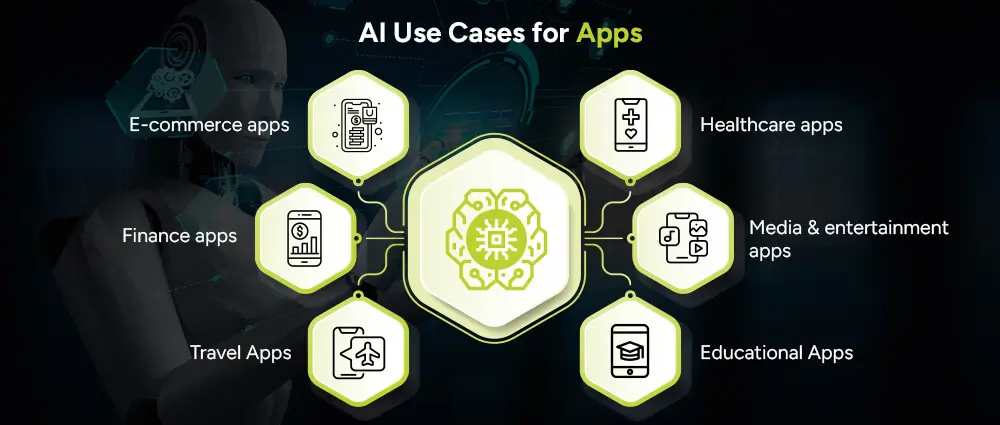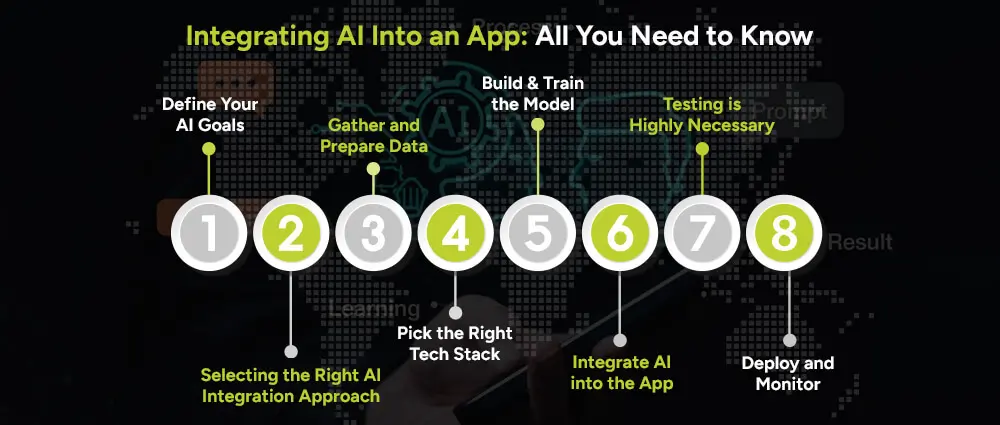2025 is the year of Artificial Intelligence; not only are we past the chatbot era, but we are now seeing AI control all sectors of life. Behind the scenes, it’s powering all the apps you use every day, from music apps like Spotify recommending your next favorite song to Google Maps predicting the fastest route, or your favorite shopping app suggesting exactly what you need before you even search for it.
This is AI in action.
Now back to the business or startup weighing the pros and cons of AI for mobile app development. You sure are not on your own. Many companies these days are asking, How might we use AI to distinguish ourselves, delight our users, and generate real value?
Today, we will look at everything about AI for mobile apps, from the theory and feature ideas, examples from real life, to the best practices.
Let us get to it so we can start applying AI to your next mobile app.
Before looking into the how, let’s first start with the what.
So, the question should be:
What is AI integration for SaaS applications and mobile apps?… and it’s benefits:
AI integration is embedding AI abilities-such as machine learning, natural language processing, image recognition, or predictive analytics-into your application so it can carry out activities requiring human intelligence.
The benefits, especially in SaaS and mobile applications, are huge.
That is why companies should use AI integration in software application development; this is becoming the standard and not an exception.
If you’re wondering whether or not you really need AI in your app, the answer depends on your goals. But here’s the truth: AI isn’t just for tech giants anymore. It’s accessible, affordable, and in many cases, essential for staying competitive.
Here’s why businesses choose to integrate AI in mobile app development:
In fact, one of the strongest benefits of AI in mobile app development is its ability to unlock hyper-personalization and predictive features that directly increase user retention.
So, what exactly can AI do for your mobile app? Let’s explore some AI use cases for apps across industries:

Personalized product recommendations, smart search, visual shopping (you only need to upload a photo and find similar products). These AI apps for e-commerce and businesses are transforming shopping experiences from one-size-fits-all to deeply tailored.
Symptom checkers, predictive health alerts, patient chatbots. This trend is shaping the future of healthcare mobile app development worldwide.
Fraud detection, spending insights, and robo-advisors are common features powered by AI. This ties closely with what is FinTech app development, which increasingly relies on AI for smarter, safer, and more efficient digital finance.
Personalization of playlists, AI content moderation, and smart editing abilities are the tools used to shape user experiences in media and entertainment. From recommendation engines at Netflix to For-you pages on TikTok, AI has been at the core of almost all entertainment apps today.
Modern AI Apps allow travel apps to predict user needs, thus providing highly personalized journeys and trouble-free experiences. Dynamic pricing engines, predictive route planning, and voice-enabled booking assistants stand in good stead to save the traveler time and money.
Personalized education is a term in which Intelligent Tutoring Systems, Automated Grading, and Adaptive Learning Routes take learners closer to distant learning. It modifies education according to students’ strengths and weaknesses such that there is an individualized learning path, one that really fits with every individual.
The AI in this case is the app’s brain from where it gradually learns from users and adapts itself to make more intelligent experiences.
Now let’s get practical. Here’s a step-by-step guide on how to integrate AI into your mobile app.

Instead of just thinking about adding AI to your app and business, start with What problem do I want AI to solve?
For example, if you’re building a shopping app, your goal might be Use AI to recommend the right product to the right customer.
This clarity will guide every decision.
There are two main approaches:
Plenty of these ready-to-use services available from different providers such as Google ML Kit, IBM Watson, and Microsoft Azure are quicker, cheaper, and suitable for common tasks such as chatbots, voice recognition, or image tagging. That’s what is known as AIaaS or Artificial Intelligence as a Service, in which businesses tap into cloud-based AI and do not have to reinvent the wheel every single time.
Building your own AI from scratch or training a model on your own data. This is time- and resource-consuming, but gives you total control and differentiation.
Choosing between the two is dictated by considerations of budget, purpose, and timeline.
AI is only as smart as the data it learns from. You need to collect high-quality, relevant data (e.g., purchase history, user activity, images), Clean and organize it so the AI can learn patterns without noise.
For example, Netflix’s recommendation engine works because it analyzes millions of viewing habits to predict what you’ll watch next.
For implementing AI in the next mobile application, the right tools are necessary. Some of the popular frameworks are:
You’ll also want to consider using a cross-platform app framework if you plan to build for both iOS and Android while keeping development costs efficient.
If you’re creating a custom AI model, you are required to:
This ensures your app’s AI doesn’t just work in theory but actually delivers results.
Now, it’s time to merge the AI with your app.
AI isn’t a one-and-done feature. Here are some ways you need to test the Artificial Intelligence in your software:
Just remember, AI improves with iterations. More improvements mean better AI apps.
Once live, monitor AI performance continuously.
AI is dynamic, it learns and adapts, but only if you monitor it closely.
Let’s bring this to life with some examples of AI integration in apps:
Customized shopping experience made possible through artificial intelligence. Amazon uses machine learning algorithms to recommend products based on browsing history, purchasing behavior, and even what is trending among similar demographics. With visual search options such as those provided by ASOS, users can upload an image and immediately locate matching products.
AI forms the core of banking and financial apps, ensuring transparency and customer service. PayPal and Revolut apply AI algorithms to detect fraudulent activity in real time.
Streaming platforms thrive on AI recommendations. For Netflix and Spotify, AI analyzes user behavior and preferences to create personalized playlists or film suggestions and even predicts the content a user will enjoy next.
These examples illuminate AI app integration that generates value across industries. Indeed, if you consider brands converging on retail and e-commerce using AI, you will see similar trends whereby AI directly shapes business outcomes.
These examples show how AI integration in apps creates value across industries. In fact, if you look at brands converging AI into retail and e-commerce, you’ll see similar trends where AI is directly shaping business outcomes.
Of course, integrating AI isn’t always smooth sailing. Some of the major challenges in integrating AI into apps include:
The good news is that these challenges can be overcome with the right foresight, partners, and best practices.
The increasing popularity of mobile application development services has now landed in the fact that businesses are investing in AI-first designs. There is much realization amongst businesses, especially small- to mid-sized companies, about why SMBs need a mobile app that can learn, adapt, and change with the time.
And if you’re brainstorming mobile app ideas for 2025, consider building with AI at the core. Whether it’s retail, fintech, healthcare, or entertainment, AI-driven apps will dominate the landscape.
In the present day, AI is no longer considered an option but an essential part of mobile app development. Master the integration of AI into your mobile app, and that would take your app in giving smarter, faster, more personalized experiences for users.
The roadmap is clear: defining goals, selecting the right strategy, overcoming challenges, and following the best practices. The only question that remains is: “When would you start with integrating AI into your app?”
Have a consultation with mobile App developers at Arpatech, and let’s work together to integrate AI in your business application.
AI-based mobile apps operate algorithms and models that imitate human intelligence. These models process data such as image, voice, or user behavior; learn these patterns; and predict or decide outcome. AI can be exemplified in language learning apps that listen to the user’s pronunciation and give feedback instantaneously.
The assistance of AI is twofold: